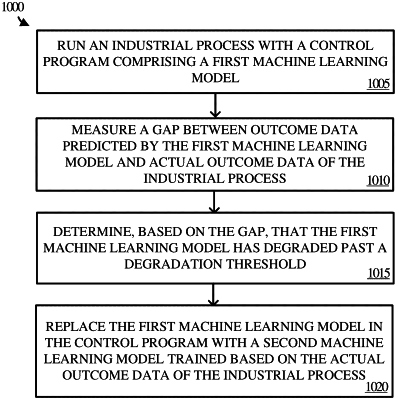| CPC G05B 19/41845 (2013.01) [G05B 19/4183 (2013.01); G06N 20/20 (2019.01)] | 20 Claims |

|
1. A system for managing model lifecycles in an industrial automation environment, the system comprising:
a memory that stores executable components; and
a processor, operatively coupled to the memory, that executes the executable components, the executable components comprising:
a control component configured to run a closed-loop industrial process, in the industrial automation environment, with a control program, wherein the control program comprises a first machine learning model;
a model lifecycle management (MLM) component comprising one or more lifecycle management machine learning models trained to:
compare outcome data predicted by the first machine learning model and actual outcome data of the closed-loop industrial process; and
upon detecting that a prediction error between the outcome data predicted by the first machine learning model and the actual outcome data exceeds a degradation threshold, identify an error reduction strategy, wherein the error reduction strategy includes replacing the first machine learning model in the control program with a second machine learning model; and
the MLM component configured to replace the first machine learning model in the control program with the second machine learning model, wherein the second machine learning model is trained based at least in part on the actual outcome data of the closed-loop industrial process.
|